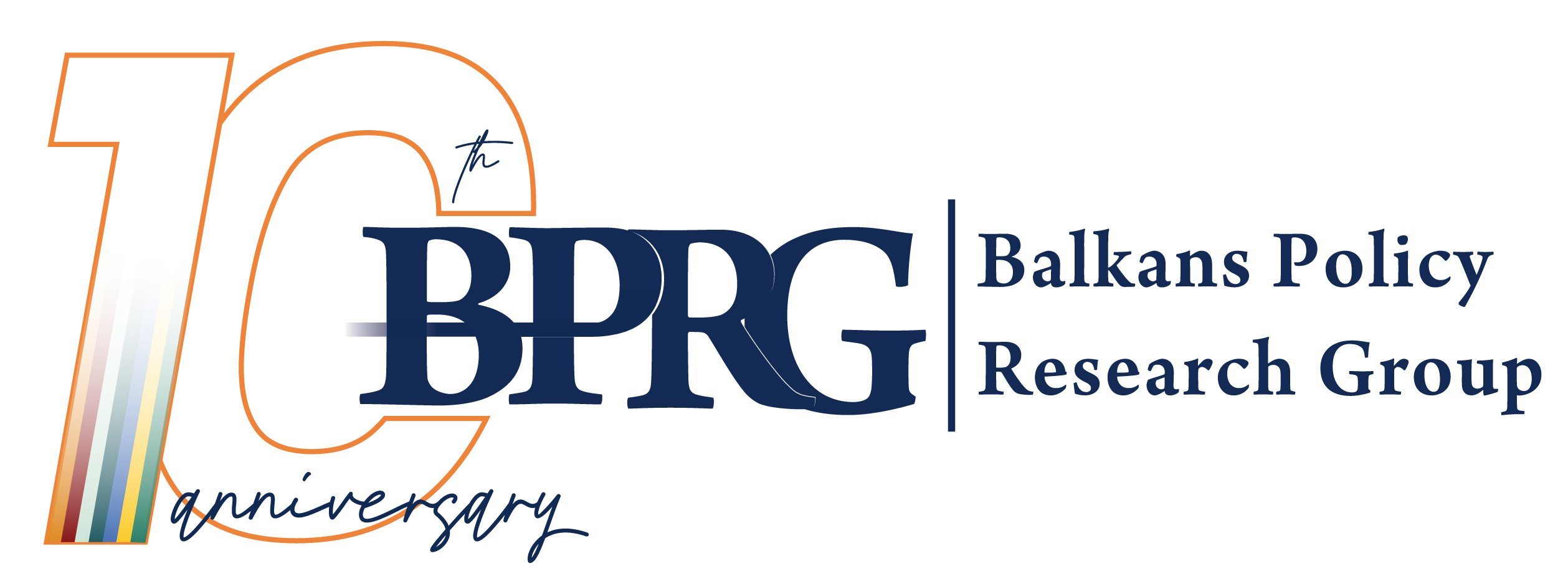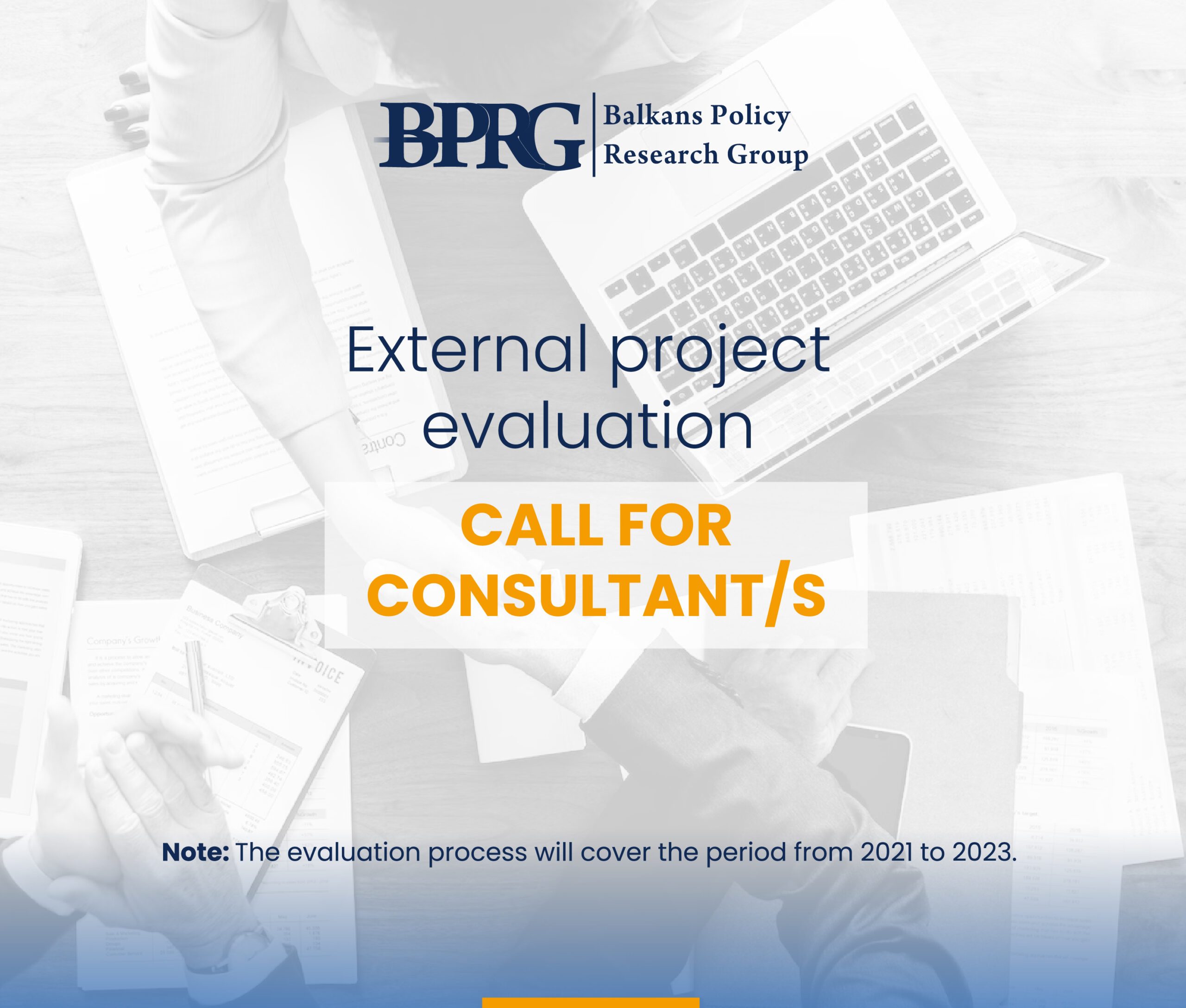Balkans Policy Research Group (BPRG) is seeking the services of an external consultant(s) for the final evaluation of the “Elevate Peace & State-building Agenda, and Advancing European Agenda” project funded by the Norwegian Ministry of Foreign Affairs/ Royal Norwegian Embassy in Prishtina.
| Implementing Organisation | Balkans Policy Research Group (BPRG) |
| Project title | Elevate Peace & State-building Agenda, and Advancing European agenda |
| Project duration | 3 years |
| Evaluation period | Jan 2021 – Dec 2023 |
Project background
Balkans Policy Research Group, supported by the Norwegian Ministry of Foreign Affairs/ Royal Norwegian Embassy in Prishtina, is implementing the project “Elevate Peace & State-building Agenda, and Advancing European Agenda”.
With this project, BPRG aims to increase inclusive policy-making, provide expertise for key institutions involved in the dialogue process, offer unique policy insights in key areas, foster democratisation, enhance the capacity building of various actors and institutions in the Western Balkans, and raise awareness of existing initiatives and their benefits while fostering greater cooperation in the region. Additionally, this activity aims to identify the best and most tangible ways and initiatives of enhancing regional cooperation in the Western Balkans by identifying and focusing on the most significant regional initiatives which can bring about practical benefits for all citizens in the region, as many are unaware of the many initiatives in the region and the benefits they bring.
The three-year project “Elevate peace & state-building agenda and advancing European agenda” targets a broad range of stakeholders: institutions, political parties, government, international institutions, media and youth.
Overall objective
Elevate peace, state-building, and European agenda, through consensus building, inclusive policymaking, expert input, and increasing political and societal support for peace, educating political representatives, supporting regional cooperation, and advancing the implementation of reforms.
Specific objectives
- Improve consensus and inclusive policymaking and increase accountability by improving policymaking and policy-coordination processes.
- Assist the political transition by empowering youth and equipping them with knowledge and skills.
- Advance the Kosovo-Serbia dialogue by providing expert support to the Government of Kosovo and the Kosovo negotiation team as well as increase the transparency and public outreach of the dialogue for citizens.
- Strengthening the public institutions in North Macedonia and Albania, through expert support component.
- Advance normalisation between Kosovo and Serbia by enhancing cooperation between civil society, communities, public officials, and experts of Kosovo and Serbia.
- Enhance regional cooperation by increasing Kosovo’s participation in regional initiatives and agendas through policy inputs and agenda settings.
- Advance the implementation of EU approximation-related agendas, the SAA and ERA, through monitoring, mobilising institutions, and public support.
Scope of the evaluation
The purpose of this final evaluation is to assess the impact and effectiveness of the project and the activities conducted during the lifetime of the project. This assessment aims to measure project results identify the best actions and approaches used and exploring what are the major factors influencing the achievement or non-achievement of project outcomes.
Evaluation methodology
The evaluation methodology should include both qualitative and quantitative methods as deemed appropriate for the purpose of this evaluation. Methods should include desk review of documents, interviews with stakeholders, partners, beneficiaries, and experts who are engaged by BPRG in public institutions, third parties (including other donors, CSO community, researchers, and public administrative officials), field visits, and the use of questionnaires or surveys. It is expected that the methodology to be revised in consultation with BPRG and beneficiaries as necessary. It should include the number of interviews for each category.
The evaluation will primarily take place in Kosovo, with additional interviews with beneficiaries to be carried out in Albania and North Macedonia.
Evaluation questions
Impact
- What is the project’s impact, and have the project outcomes been achieved?
- How has the project impacted the desired target actors, and to what extent?
- To what degree did the project contribute to the development in line with the project goals?
- Has the project influenced policymaking at different levels?
Effectiveness and Efficiency
- Was the project both efficient and effective from a process viewpoint?
- Has the project been on track to achieve its expected results?
- Did the project appropriately reach its target groups?
- Which activities produced the best results?
Relevance and Fulfilment of Objectives
- Were the areas of intervention relevant and adequate for the target groups and the overall expected results of the project?
- Did project milestones and results contribute to the overall objectives of the project?
- Did the project reach the targeted beneficiaries as intended?
Sustainability
- Is there evidence of long-lasting desired changes caused by the project?
- Are there results that are expected to continue after the conclusion of the project?
- What approaches contribute to the continuation and sustainability of results?
Management, Financial, and Administrative Capacity
- Did the implementing partner possess the necessary management, financial, and administrative capacities to implement the project?
- Were appropriate working practices applied in the design and implementation of the project?
- Was the donor appropriately engaged in the implementation of the project?
- Was the Management Board properly consulted, and were the action points addressed and followed up in meetings?
Lessons Learned and Recommendations:
- What lessons can be drawn from the project’s implementation, and what could be done differently?
- What should be the main strategic elements to be considered in similar interventions in the future?
- Are there any special considerations to be taken into account when designing and implementing similar interventions in the future?
- Has the project influenced policymaking at different levels?
- Based on the work’s findings, we may formulate additional questions to further refine our evaluation process.
The contracted party will be responsible for:
- Formulating the final evaluation methodology designed to address the questions and areas specified in the Terms of Reference (ToR).
- Planning and executing meetings, interviews, and focus group discussions with the concerned stakeholders.
- Request relevant materials and contacts from BPRG.
- Prepare the draft of the evaluation report.
- Delivering a formal presentation of the report to the BPRG management.
- Addressing feedback and comments from the BPRG and other relevant stakeholders.
- Adhering to the agreed-upon timelines and deadlines.
- Submitting the final version of the report.
The contracted party will provide to BPRG, as the primary beneficiaries of this evaluation report, the following:
- Evaluation Report in English (max 25 pages), and its annexes; and
- Working documents (list of contacts that were interviewed/took place in meetings, interviews, focus group discussions, mailing lists, plan of activities, questionnaires, PowerPoint presentations, and all other relevant working documents).
Main Outputs/Deliverables
The final report should be written in English; should not exceed 25 pages (without annexes); should contain but not limited to the following information:
- Executive summary (max 2 pages)
- Introduction to provide information on the evaluation scope, methodology, and limitations, if any (max 2 pages)
- Description of the project (1 – 2 pages)
- Findings based on the evaluation questions and the project’s effects on the intervention areas (max 10 pages)
- Conclusions (max 3 pages)
- Lessons learned (max 3 pages)
- Recommendations (max 3 pages)
- Annexes (are not counted within the 25 pages of the main report)
- BPRG reserves the right to request additional information or based on sound argumentation, request corrections or necessary revisions in the report. BPRG reserves the right to contact only the selected organization/applicant.
- BPRG reserves the right to cancel all or adapt the TORs and republish the call for offers.
- The final report should not exceed 25 pages; Font – Garamond 11; Line spacing – Multiple; Sentence space – 1.15; Pages should have numbers
Required skills and competencies
- Advanced academic background in political sciences, international relations, and other relevant fields.
- Experience in evaluations, research conduction, and analysis of similar complexity.
- Knowledge of the political situation in Kosovo and Serbia, and the EU facilitated dialogue; regional cooperation; good governance, and state building.
- Excellent report writing and presentation skills.
Quality standards
The final evaluation shall conform to OECD/DAC’s Quality Standards for Development Evaluation[1] and shall use the OECD/DAC Better Criteria for Better Evaluation[2]. The evaluators shall specify how quality assurance will be handled by them during the evaluation process, taking into account the aforementioned quality standards.
TIMEFRAME
How to apply
Interested candidates or companies should send the following documents to [email protected] no later than 30 October.
- Curriculum Vitae (CV).
- Technical proposal: outlining the methodology envisaged for the assignment for delivering the expected results within the indicated timeframe.
- Financial proposal.
Note: The evaluation process will cover the period from 2021 to 2023. The upcoming project phase is scheduled from 1 January 2024 to 31 December 2024. If we are satisfied with the overall performance and the quality of the final report, we intend to engage the same contractor for the next phase. Payment will be made only after the final report is approved.
[1] https://www.oecd.org/dac/evaluation/daccriteriaforevaluatingdevelopmentassistance.htm
[2] https://www.oecd.org/dac/evaluation/revised-evaluation-criteria-dec-2019.pdf



